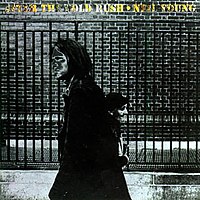
Band: Neil Young
Album: After The Gold Rush
Why Rolling Stone gets it right: Neil Young's this solo album marked a period of prolificness (yes, "prolificness" is a word. I looked it up) in Young's career. He'd released two solo albums in the previous year, as well as "Deja Vu" with CSNY. Building on the ethos of the Boomers letdown of the late '60s, "After The Gold Rush" bounces from optimism to pessimism in a matter of a minute. "Tell Me Why," the title track, "When You Dance I Can Really Love" and "Southern Man" are classics.
Why Rolling Stone gets it wrong: It's not Young's best effort (that'd be "Harvest," listed seven positions down at 78), nor is it his most identifiable. In the original RS review, the reviewer called it "dull" and -- save for "Southern Man" -- it is.
Best song: "Southern Man" portends the fantastic protest music that Young would write ("Ohio" in 1971 and "Alabama" in 1972 come to mind).
Worst song: "'Til The Morning Comes" is pretty bland. Thankfully, it's only a minute long.
Is it awesome?: It's close, but it falls short.
In his constant battles with his band Crazy Horse, Neil Young must have fired them 20 times. Before recording "After The Gold Rush" was the first time. So, Young built a tiny studio in his house, holed himself in there and record "After The Gold Rush."
Mostly inspired by a never-shot screenplay of the same name, "After The Gold Rush" is full of Young staples. There's a soft-ish plea for a cause (the environment on the title track), a love song with strange metaphors and an all-out attack on something (the South on "Southern Man"). What makes "After The Gold Rush" great is not just the brilliance of those archetypes, but the expansion of other songs. The storytelling of "Don't Let It Bring You Down," the country-tinged optimism of "I Believe In You" and the melancholy sad love of "Tell Me Why." It's an expansion of Young's abilities and that's to be celebrated.
At the risk of sounding like a boomer myself, "After The Gold Rush" is Young's "Rubber Soul." It had shades of brilliance before the actual masterpiece. In this analogy, "Rubber Soul":"After The Gold Rush, as "Revolver":"Harvest."

No comments:
Post a Comment